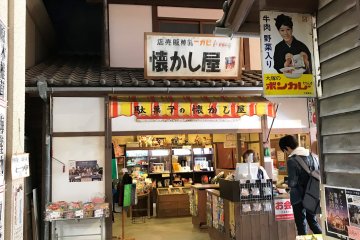Located within the interior mountain ranges of Oita Prefecture is a small village called Ajimu. Known as the family travel village, visitors can book various types of accommodation from log cabins to traditional Japanese homes. I was pleased to find that there are homestay opportunities available as well and jumped at the chance to go somewhere relatively unknown and exciting.
When I arrived the Ajimu bus station, I was given a short introduction and tour of the area by a friendly guide. Ajimu is well known for its grapes so I was taken to a local winery to sample some of the delicious beverages. There are also a variety of calming herb water drinks as well. The herb drinks made to help your body quickly replenish after visiting the popular Ajimu hot springs. After the winery, I visited the beautiful Higashi-shiya waterfall. We parked and took a winding trail to the base where visitors can stand right next to the 85 meter falls. To this day, mountain ascetics known as Yamabushi, use Higashi-shiya for purification rites making this a very historic and unique place. The entire area is surrounded by lush forests and green everywhere you look, providing ample opportunity for some fantastic views. I then traveled to a small part of Ajimu that was clustered with Meiji-era (1868-1912) buildings and artwork adorning the architecture. Walking through this area there is a real sense of going back in time. After my brief tour, I set off to join the farm stay experience.
When I arrived at the farm stay location, high up in the mountains, I was greeted by Mr. and Mrs. Eto who helped me get settled in. They were very kind and seemed very excited to share their city and home with a traveler. The Eto household, like most in the area, is a very traditional Japanese-styled home with tatami rooms and sliding panel doors. After taking some time to get settled in and given a tour of the property I jumped right into the farm experience.
The farming is not at all strenuous or demanding, but rather a fun introduction to some basic techniques employed here on a regular basis. I was given the opportunity to chop wood, plant tomatoes, and cook rice in an outdoor stone hearth. I had a great experience cutting down bamboo, sawing it into sections and constructing a traditional watering device. This is made all the more fun as you get a chance to speak and laugh with the family and children as they compete to be the first to teach you the next activity. After the farm work was finished, I was taken to a local onsen to relax from my busy day of traveling, sightseeing, and working. Although the onsen is indoors, it utilizes large, open panels so the backdrop consists of sprawling countryside. The onsen is another great opportunity to speak with friendly locals who really go out of their way to make you feel welcome.
While away at the onsen, a home-cooked dinner was being prepared. When we returned to the family home, I was amazed at the size of the dinner waiting for us. There was an array of chicken, tonkatsu (fried pork), a collection of salads (including vegetables grown right outside), and the largest and tastiest grapes I have ever had. After a full meal, pleasant conversation and a few games we called it a night. After my full day of laughter, farm work and new experiences I slept like a baby.
The following morning, I awoke to an amazing smell and found a generous breakfast including eggs, fish, fruit, coffee, and a special Oita Prefecture beverage made from locally-grown pears. The panel doors were open and the mountain breeze permeated the room. Instead of TV, there were sounds of swaying trees and the distinctive songs of Uguisu, the Japanese bush-warbler bird. I could not imagine a more tranquil way to spend a day or a weekend.
If you are interested in some of the more obscure and rural aspects of Japanese culture, I highly recommend this kind of homestay in Ajimu. The peaceful atmosphere, farming experience, and kindness of the hosts will ensure a fun, edifying, and memorable experience.
To get to Ajimu, first take the shinkansen to Kokura station followed by the the local train to Nakatsu station. From Nakatsu station there is a local bus that will take you up to Ajimu.
















